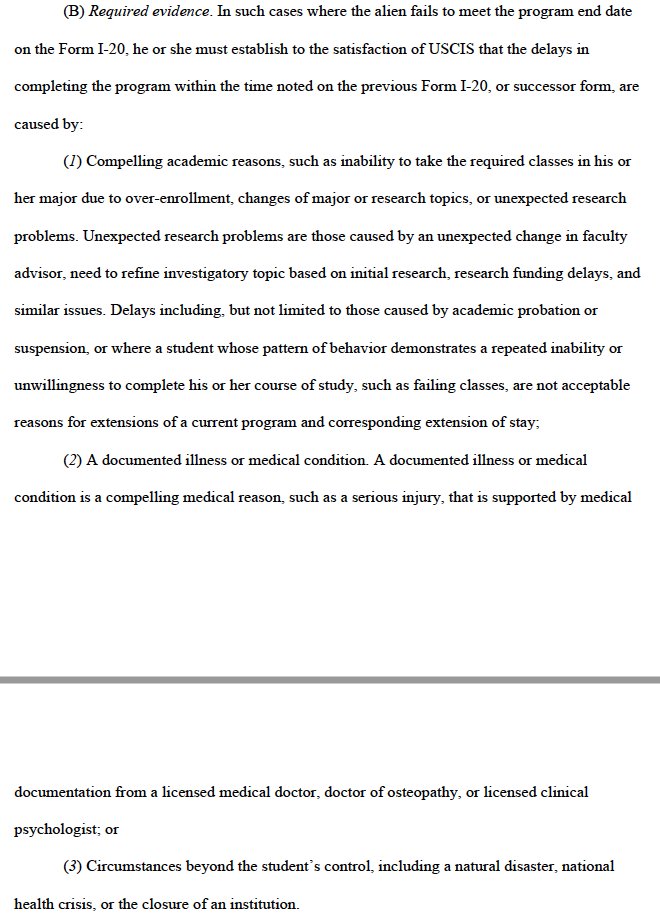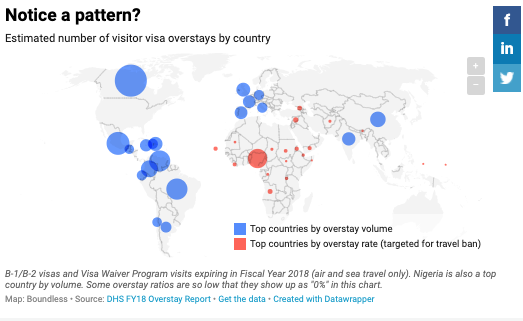Today DHS unveiled a regulatory plan to severely restrict international students & exchange visitors, by making it difficult for them to stay in the US for their full duration of study.
Let's dive into this latest thicket of useless red tape...
1/
federalregister.gov/documents/2020…
Let's dive into this latest thicket of useless red tape...
1/
federalregister.gov/documents/2020…
Status quo: Your student visa lasts until you've finished your studies; there's no hard expiration date.
Proposed rule: Most students on an F-1 visa would have a hard 4-year expiration date—only 2 years for language training—with limited ability to apply for an extension.
2/
Proposed rule: Most students on an F-1 visa would have a hard 4-year expiration date—only 2 years for language training—with limited ability to apply for an extension.
2/
If your course of study ends up taking longer than 4 years, DHS won't accept very many grounds for an extension.
3/
3/

Student visa would be limited to 2 years for:
*Natives or citizens of countries on the State Sponsor of Terrorism List (Iran, Syria, Sudan, PRK)
*Citizens of countries with >10% overstay rate
*Unaccredited school
*School that doesn't use E-Verify
4/
state.gov/state-sponsors…
*Natives or citizens of countries on the State Sponsor of Terrorism List (Iran, Syria, Sudan, PRK)
*Citizens of countries with >10% overstay rate
*Unaccredited school
*School that doesn't use E-Verify
4/
state.gov/state-sponsors…
Think about this. If you're *born* in Iran, Syria, Sudan, North Korea (or any other country added to the list), it doesn't even matter where you grew up—you're a presumed security threat & can only get a 2-year student visa (with possible but not guaranteed extensions).
5/
5/
And about countries with a >10% overstay rate—that's just a clever way to say "basically Africa."
6/
slate.com/news-and-polit…
6/
slate.com/news-and-polit…
Red: Countries w/ >10% overstay rate
Blue: Countries w/ the most people actually overstay their visas
If you were legit concerned about visa overstays, would you care more about Canada (maybe 88k overstays) or, say, Mauritania (maybe *80* overstays)?
7/
boundless.com/blog/is-a-new-…
Blue: Countries w/ the most people actually overstay their visas
If you were legit concerned about visa overstays, would you care more about Canada (maybe 88k overstays) or, say, Mauritania (maybe *80* overstays)?
7/
boundless.com/blog/is-a-new-…

New international student enrollment at U.S. universities has fallen 10% since 2015—this is a disaster for our economy & international standing, but the Trump administration is looking for every way to accelerate this decline.
via @NFAPResearch:
8/
forbes.com/sites/stuartan…
via @NFAPResearch:
8/
forbes.com/sites/stuartan…
DHS tried earlier to mess with int'l students via policy guidance, but got smacked down in court (thanks to @GuilfordCollege et al., represented by @PaulWHughes).
So of course now DHS is roaring back with a regulatory version.
9/
(via @karinfischer)
opencampusmedia.org/2020/08/03/a-q…
So of course now DHS is roaring back with a regulatory version.
9/
(via @karinfischer)
opencampusmedia.org/2020/08/03/a-q…
The Trump administration is racing to complete a slew of anti-immigrant regulations this fall, given that it only has a few more months of guaranteed time left.
They have almost no time to get this int'l student rule finalized before Jan. 2021.
10/
They have almost no time to get this int'l student rule finalized before Jan. 2021.
10/
https://twitter.com/doug_rand/status/1303329910480568321
But one other self-destructive consequence if this reg does go live: Guess who will have to process millions of extra student visa extensions?
@USCIS, the same agency that's gone nearly bankrupt under Trumpian mismanagement & red tape already.
11/11
nyujlpp.org/quorum/the-cas…
@USCIS, the same agency that's gone nearly bankrupt under Trumpian mismanagement & red tape already.
11/11
nyujlpp.org/quorum/the-cas…
• • •
Missing some Tweet in this thread? You can try to
force a refresh









